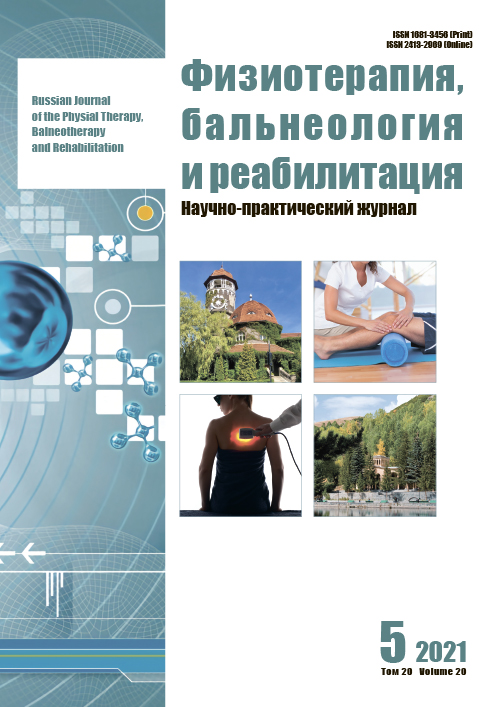Influence of beta-rhythm neurofeedback on the functional state of the cardiovascular system of athletes
- 作者: Lunina N.V.1, Koryagina J.V.2
-
隶属关系:
- Russian State University of Physical Culture, Sports, Youth and Tourism
- North Caucasian Federal Scientific Clinical Centre
- 期: 卷 20, 编号 5 (2021)
- 页面: 405-412
- 栏目: Original studies
- ##submission.datePublished##: 25.08.2021
- URL: https://rjpbr.com/1681-3456/article/view/107467
- DOI: https://doi.org/10.17816/rjpbr107467
- ID: 107467
如何引用文章
详细
BACKGROUND: The study of the effects of urgent and long-term adaptation of the cardiovascular system of athletes under the influence of beta-rhythm neurofeedback expands its corrective and restorative potential for use in the practice of sports medicine and rehabilitation.
AIMS: Study of the restorative and rehabilitation potential of the influence of beta-rhythm neurofeedback on the functional state of the cardiovascular system of athletes.
MATERIAL AND METHODS: The course of neurofeedback on the beta rhythm of the brain consisted of 10 sessions, including a graphical and game version of the representation of the controlled parameter (beta rhythm) on the computer monitor screen, the success of controlling the beta rhythm with the specified conditions of voluntary muscle relaxation during the session was supported by visual and auditory biological feedback. Registration of indicators of the cardiovascular system was carried out before and after the 1st, 5th and 10th sessions of the course, the dynamics during the course and individual sessions is represented by the growth rate (%) of the indicators.
RESULTS: A course of neurofeedback on the beta-rhythm of the brain of 10 sessions were young athletes (n=1020) aged 18–21, representatives of cyclic, acyclic and game sports in the preparatory period of the training cycle.
The effects of urgent adaptation in athletes at the 1st session of the neurofeedback course according to the beta-rhythm of the brain are reflected by positive changes in the strengthening of the vagal influence of the parasympathetic nervous system on the functional state of the cardiovascular system, expressed in a decrease in heart rate, systemic pressure, performance and pumping functions of the heart, in the transition of the type of regulation of blood circulation from the unfavorable hyperkinetic type to the physiological ― eukinetic ― type. At the same time, the load on the peripheral vascular bed increased, especially on its precapillary section.
The effects of long-term adaptation at the 10th session of the neurofeedback course according to the beta-rhythm of the brain are represented by systemic rearrangements with an increased influence of the parasympathetic nervous system in the functioning of the cardiovascular system of athletes, reflected in the maximum decrease in heart rate throughout the course, in an equivalent decrease in systemic pressure, stabilization of performance and pumping function of the heart, achievement and preservation of the eukinetic type of regulation of blood circulation, achievement of a stable stable state of the central and peripheral vascular bed with a slight response to environmental factors.
CONCLUSION: A course of neurofeedback on the beta-rhythm of the brain of 10 sessions helps to reduce stress in the functioning of the cardiovascular system of athletes by enhancing the vagal influences of the parasympathetic nervous system, has a positive effect on heart rate, systemic pressure, performance and pumping function of the heart; promotes the transition from an unfavorable hyperkinetic to a physiological eukinetic type of circulatory regulation; has a positive effect on adaptive changes in indicators of general and peripheral vascular resistance. The revealed effects of the course of neurofeedback on the beta-rhythm of the brain are of a pronounced corrective and restorative nature during the intense functioning of the cardiovascular system of athletes and can be used in sports rehabilitation and rehabilitation practice.
全文:
作者简介
Natalya Lunina
Russian State University of Physical Culture, Sports, Youth and Tourism
编辑信件的主要联系方式.
Email: natalya-franc@mail.ru
ORCID iD: 0000-0003-1782-3217
SPIN 代码: 6349-4460
Cand. Sci. (Biol.), Associate Professor
俄罗斯联邦, MoscowJulia Koryagina
North Caucasian Federal Scientific Clinical Centre
Email: natalya-franc@mail.ru
ORCID iD: 0000-0001-5468-0636
SPIN 代码: 2561-9482
Dr. Sci. (Biol.), Professor
俄罗斯联邦, Essentuki参考
- Koryagina YuV, Roguleva LG, Zamchiy TP, Zaitsev KS. Medico-biological means of improving the performance and recovery of athletes. Fundamental Res. 2013;(10-8):1753–1757. (In Russ).
- Achkasov EE, Mashkovsky EV, Bezuglov EN, et al. Medico-biological aspects of recovery in professional and amateur sports. Medical Bulletin of the North Caucasus. 2018;13(1-1):126–132. (In Russ). doi: 10.14300/mnnc.2018.13035
- Nazarov VB, Sereda AP, Klyuchnikov MS, Samoilov AS. Innovations in the system of medical and biological support of athletes of national teams of the Russian Federation. Medicine of extreme situations. 2015;(4):33–37. (In Russ).
- Koryagina YuV, Abutalimova SM, Roguleva LG, et al. On the issue of developing effective recovery strategies for Athletes during their Stay at training camps at Federal sports training bases. Modern issues of biomedicine. 2020;4(1):35–39. (In Russ).
- Stark MB, Pavlenko SS, Skok AB, Shubina OS. Biofeedback in clinical practice. Neurol J. 2000;5(4):52–56. (In Russ).
- Stark MB, Skok AB. Application of electroencephalographic biofeedback in clinical practice (literature review). In: Bio-management 3. Theory and practice: a collective monograph. Novosibirsk: Tsehris; 1998. Р. 131–139. (In Russ).
- Lunina NV, Kalinina IN. Dynamic changes in the parameters of spectral analysis of athletes’ heart rate in the process of neurofeedback. Modern problems of science and education. 2015; (2-2):808. (In Russ).
- Kahana MJ, Seelig D, Madsen JR. Theta returns. Curr Opin Neurobiol. 2001;11(6):739–744. doi: 10.1016/s0959-4388(01)00278-1
- Thompson L, Thompson M, Reid A. Neurofeedback outcomes in clients with Asperger’s syndrome. Appl Psychophysiol Biofeedback. 2010;35(1):63–81. doi: 10.1007/s10484-009-9120-3. 63-81
- Dembo AG, Zemtsovsky EV. Sports cardiology: a guide for doctors. Leningrad: Meditsina; 1989. 460 p. (In Russ).
补充文件






